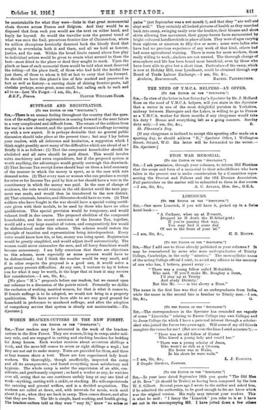SUFFRAGE AND REGISTRATION.
(To THE Roma or TEA " erzersvoa."1 Ste,—There is an uneasy feeling throughout the country that the ques- tion of the suffrage and registration is coming forward in the near future In a very complicated and difficult form. The return of the soldiers from the war is a new element, and the question of woman's suffrage is coming up with a new aspect. It is perhaps desirable that no general public discussion should take place at the present time ; but may I lay before your readers, with all deference and hesitation, a suggestion which I think might possibly meet many of the difficulties which are ahead of US ? Briefly it is as follows : (1) That the compound householder should be abolished and all rates should be paid direct. This would involve extra machinery and extra expenditure, but if the proposed system is worth anything, the advantages would greatly outweigh this drawback. (2) That Income Tax receipt forms should bear on them a brief summary of the manner in which the money is spent, as is the case with rate demand notes. (3) That every man or woman who can produce a receipt for rates or for Income Tax paid by him or her should have a vote in the constituency in which the money was paid. In the case of change of residence, the vote would remain in the old district until the next pay- ment was made, and would then be transferred to the new district. (4) That criminals, lunatics, and illiterates should have no vote. (5) That soldiers who have fought in the war should have a special voting certifi- cate given with their medals, to be used by those who have no other qualification. This special provision would be temporary, and would exhaust itself in duo course. The proposed abolition of the compound householder, and the recent extension of the Income Tax, together, would add a very large number of voters, and comparatively few would be disfranchised under this scheme. This scheme would restore the principle of taxation and representation being interdependent. Every voter would know how his, or her, money was being spent. Registration would be greatly simplified, and would adjust itself automatically. The women could never outnumber the men, and all fancy franchises would become unnecessary. I am fully conscious that there are objections to this scheme, more especially as some persons would have to be disfranchised ; but I think the number would be very small, and if in other respects the proposal is a good ono, it would solve a greet many present difficulties. At any rate, I venture to lay it before you for what it may be worth, in the hope that at least it may receive fair consideration.—I am, Sir, &c.,
[We place " M.'s " proposals before our readers, but we cannot open our columns to a discussion of the points raised. Personally we dislike the exclusion of working married women, for that is what it comes to. If female suffrage is to be adopted, we would not bring in a property qualification. We have never been able to see any good ground for household in preference to manhood suffrage, and after the adoption of compulsory service that system is clearly not maintainable.—En. Spectator.]


































 Previous page
Previous page